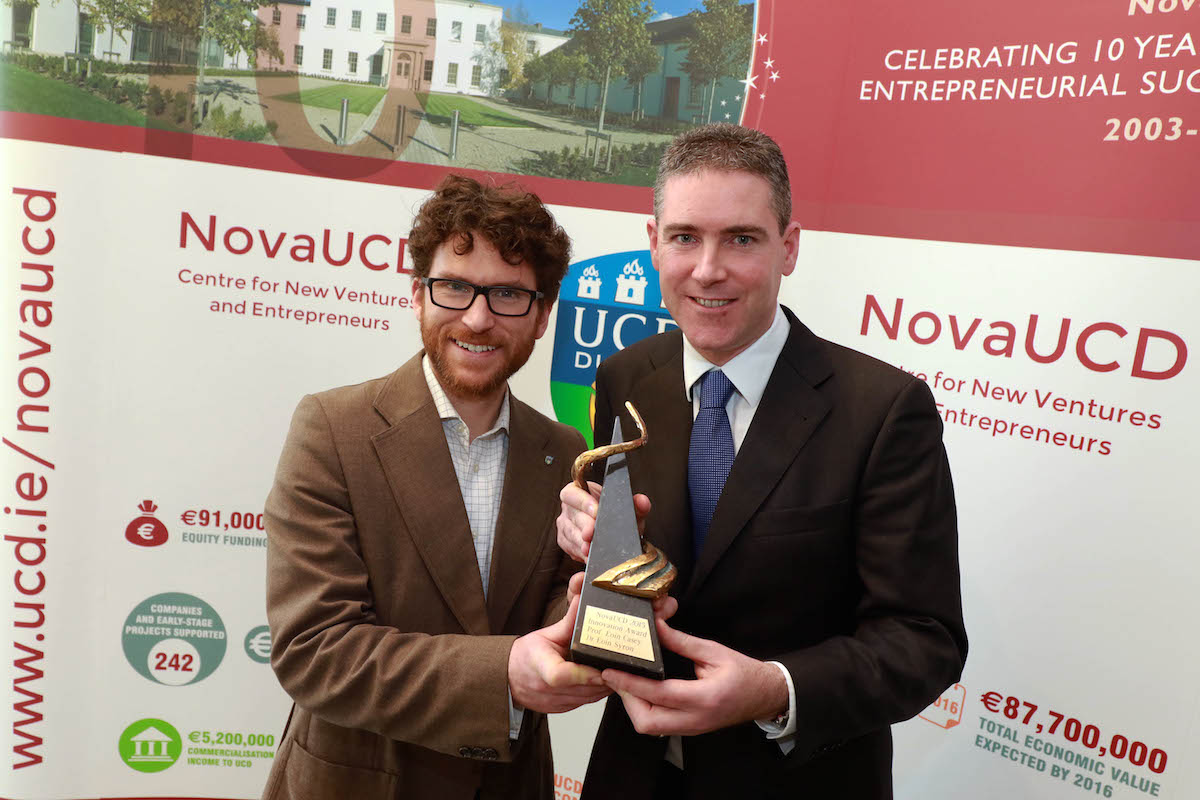Co-founders of spin-out firm OxyMem receive NovaUCD 2015 Innovation Award

Posted 15 December, 2015
- Company set to triple manufacturing production and create 15 new jobs in 2016
- Technology reduces the operating costs for wastewater aeration – the process of adding air into wastewater – and results in a four-fold saving on energy costs
University College Dublin President, Professor Andrew J. Deeks, has presented the co-founders of (opens in a new window)OxyMem – a UCD spin-out company producing technology that efficiently treats pollutants in wastewater – with the NovaUCD 2015 Innovation Award.
The NovaUCD Innovation Award was established in 2004 to highlight UCD’s commitment to innovation. The award is presented annually to an individual, company, organisation or group, in recognition of excellence in innovation, or of success achieved in the commercialisation of UCD research or other intellectual activity.
Former recipients include Dr Viliam Holub and Dr Trevor Parsons, the co-founders of (opens in a new window)Logentries, who received the NovaUCD 2013 Innovation Award. Last October, Logentries, a UCD spin-out company that specialises in data analytics, was acquired by Rapid7 for $68 million.
UCD President, Professor Andrew J. Deeks, presented the NovaUCD 2015 Innovation Award to the co-founders of OxyMem, Professor Eoin Casey and Dr Eoin Syron.
Pictured top: Dr Eoin Syron and Professor Eoin Casey, co-founders of UCD spin-out firm OxyMem, which produces technology that efficiently treats pollutants in wastewater, with their NovaUCD 2015 Innovation Award; and below, a short video explaining how OxyMem's technology solves energy intensive wastewater treatment with smart aeration
Professor Casey is Head of the UCD School of Chemical and Bioprocess Engineering and Dr Syron is a lecturer at the UCD School of Chemical and Bioprocess Engineering.
The co-founders of the company were presented with the award in recognition of the success and impact that the UCD spin-out firm has achieved to date in the international, multi-billion euro wastewater treatment industry.
Wastewater aeration is the process of adding air into wastewater to allow aerobic bio-degradation – the breakdown of organic contaminants by microorganisms when oxygen is present – of the pollutant components.
OxyMem’s (opens in a new window)Membrane Aerated Biofilm Reactor (MABR) technology dramatically reduces the operating costs for wastewater aeration and results in a four-fold saving on energy costs when compared to forced aeration, the current industry standard.
The company’s technology does not rely on the traditional method of wastewater aeration of using bubbles to transfer oxygen to the bacteria in wastewater.
Instead, it uses gas permeable membranes, which allows oxygen to be transferred directly to the bacteria treating the wastewater, resulting in up to 99% transfer efficiency, as no oxygen is lost in the atmosphere.
“The award not only recognises the success of OxyMem over the last few years but also recognises the ten years of research and development activities at UCD on which OxyMem is built,” said Professor Casey, who is the Chairman of OxyMem.
The UCD spin-out currently operates a 25,000 sq. ft. facility and offices in Athlone, Co. Westmeath, to manufacture its Membrane Aerated Biofilm Reactor.
The firm employs over 40 people and has already raised €2.5 million from investors and Enterprise Ireland and secured clients in Ireland, the UK, Spain, Sweden and in North America, the Middle East and the Far East.
Wayne Byrne, Managing Director, OxyMem, said the company is planning to increase manufacturing "three-fold" and to create at least 15 new jobs during 2016.
“OxyMem, established to commercialise world-class UCD research outputs, is an excellent example of the quality of companies now emerging from the university," said UCD President, Professor Andrew J. Deeks.
OxyMem’s Membrane Aerated Biofilm Reactor (MABR) technology, which was made in UCD by Professor Casey and Dr Syron, was also developed and refined with funding provided by (opens in a new window)Enterprise Ireland and (opens in a new window)Science Foundation Ireland.
By: Jamie Deasy, digital journalist, UCD University Relations
UCD academics on The Conversation
- Opinion: The leap year is February 29, not December 32 due to a Roman calendar quirk – and fastidious medieval monks
- Opinion: Nigeria’s ban on alcohol sold in small sachets will help tackle underage drinking
- Opinion: Nostalgia in politics - Pan-European study sheds light on how (and why) parties appeal to the past in their election campaigns






